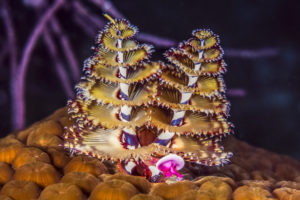There are so many things to look at underwater that you might not, at first, notice the unassuming Christmas tree worm. You’ll find these easily recognizable creatures on tropical reefs all over the world, and despite their simple appearance, they do have some interesting characteristics.
What is a Christmas tree worm?
As a newbie diver, most of us learn a trick with Christmas tree worms. These small creatures stick out of coral heads, looking just like Christmas trees made of small pipe cleaners. If you swim too near a Christmas tree worm — without touching it or the coral, of course — it will withdraw inside the coral in a split second. This is their defense mechanism to hide from potential predators.
Despite their name, these creatures are not trees but segmented worms. Their nickname comes from their appearance, as they have two colored feather-like crowns that come out of their body. They use these to feed on phytoplankton and other micro-organisms, as well as to breathe.
Their average length is about 1.5 to 2 inches (4 to 5 cm), and they display a wide range of colors. Despite their small size and simple appearance, they have a central brain and full nervous systems. To reproduce, they just pour their eggs into the water where the currents carry them away.
Where do they live?
You can find the Christmas tree worm on most tropical reefs. They are sedentary, as they feed using their crown. These worms usually live on big coral heads inside a tube that will serve as both home and protection. They are abundant with few predators and are therefore not considered an endangered species.
Finally, they make great subjects for the underwater photographers, as they are bright, colorful, and sedentary with a very distinctive shape. Just be sure to approach them slowly, or else they’ll disappear before your eyes.


